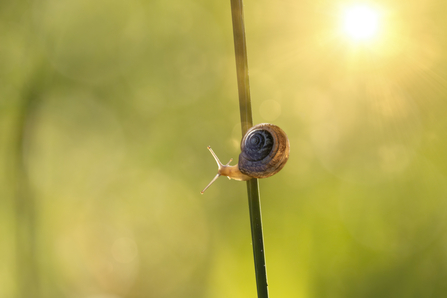Slugs and snails have long been viewed as a gardener’s greatest foe, but this reputation isn't deserved. There are around 150 species of slugs and snails in the UK, and only a small fraction of these pose problems for gardeners. The majority contribute positively to the garden ecosystem in a number of ways. By learning to appreciate and coexist with these creatures, gardeners can adopt a more environmentally friendly approach to gardening.
While they may not be as valued as earthworms, slugs and snails provide several important services in our green spaces. One of their most significant roles is as nature’s clean-up crew; molluscs feed on rotting plants, fungi, dung and even carrion, helping to recycle nitrogen and other nutrients and minerals back into the soil. They can also clean algae off the glass of greenhouses, leaving behind their trademark trails.
Many of our much-loved garden visitors, including frogs, song thrushes, and ground beetles, rely on slugs and snails as a key food source. They also make up part of a hedgehog’s diet. By supporting these molluscs, gardeners indirectly support a diverse array of wildlife. In addition, territorial slugs, such as leopard slugs, can be helpful in warding off other species of slug and therefore protecting plants from grazing.
Follow these five tips to live harmoniously alongside slugs and snails:
-
Provide shelter: Create habitats for slugs and snails by leaving log piles, mulch, and natural debris in garden areas. These spaces offer shelter and a food source for these creatures, and it may make them less likely to venture out into your vegetable bed.
-
Selective planting: Choose plants that are less attractive to slugs and snails or are more resilient to their feeding habits, such as lavender, rosemary, astrantia, hardy geraniums, hellebores and hydrangeas.
-
Barriers: Implement barriers – such as copper tape and wool pellets – which may provide some protection for vulnerable plants from slug and snail damage.
-
Handpick and monitor: Regularly inspect plants for signs of slug and snail damage, and manually remove any you find, relocating them to your compost heap or areas with less vulnerable plants. Consider evening patrols with a torch, as slugs and snails are most active at night-time.
-
Encourage predators: Create a haven for natural predators of slugs and snails, such as ground beetles, song thrushes, frogs, and toads, by providing suitable habitats, such as long grass, log piles and wildlife-friendly ponds. Predators help to naturally regulate slug and snail populations, keeping their numbers in balance.

